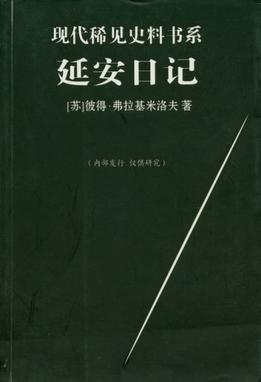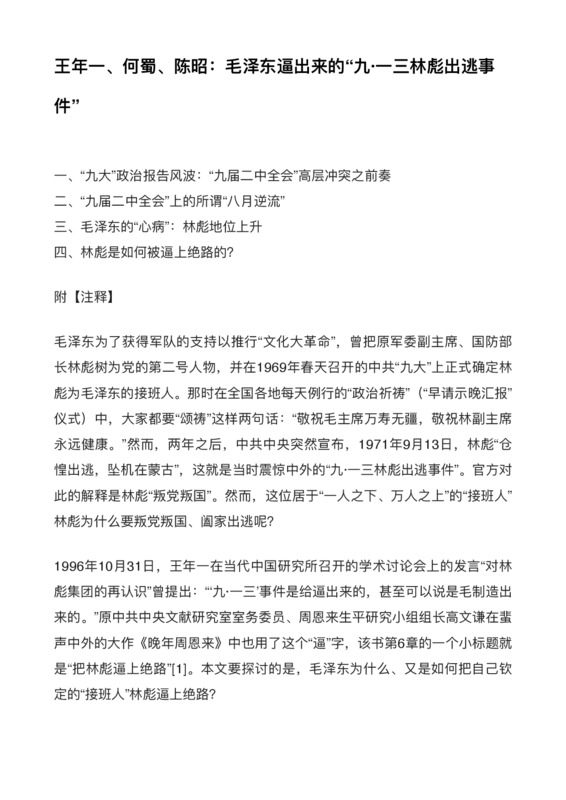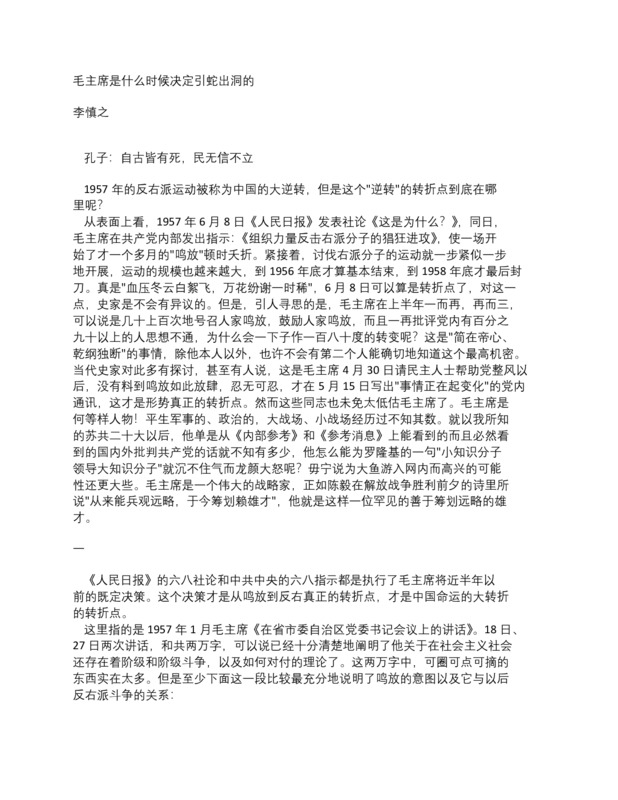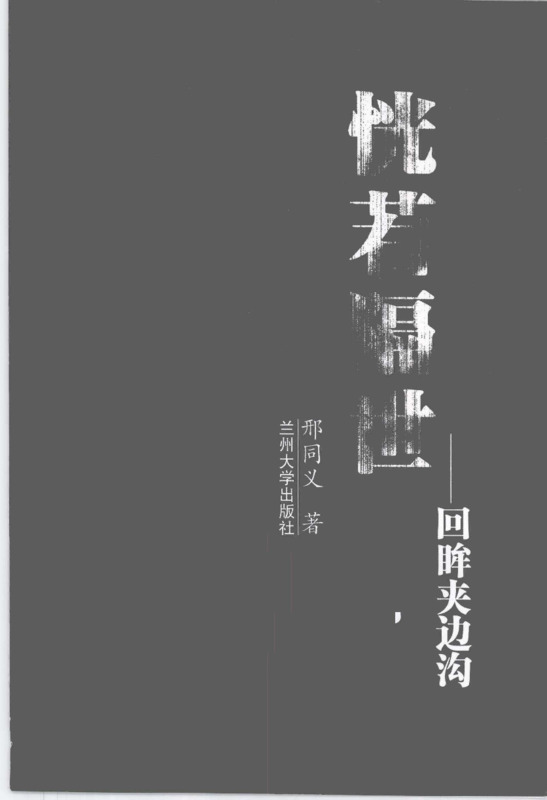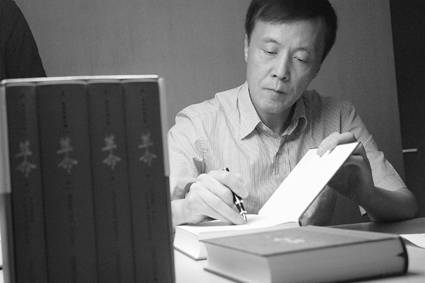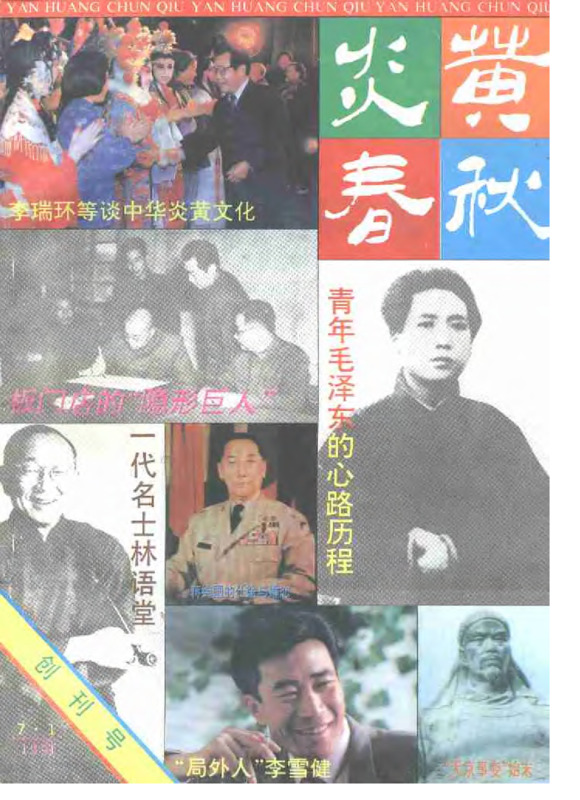Explore the collection
Showing 72 items in the collection
72 items
Book
The Vladimirov Diaries: Yenan, China 1942~1945
The author of The Vladimirov Diaries: Yenan, China, 1942~1945, Peter Vladimirov (Sun Ping in Chinese) was a Soviet citizen. The book was first published in the 1980s by Oriental Publishing House and reprinted in March 2004. Peter traveled to Yan'an from 1942 to 1945 as a liaison officer of the Comintern and a correspondent for the TASS news agency. He kept a diary of the political, economic and cultural aspects of Yan'an, including its opium economy. Against the background of the relationship between the CCP and the Soviet Union during the War of Resistance against Japanese Aggression, the book describes the CCP's Rectification Movement and the Seventh National Congress. It also comments on the CCP's contact with the U.S. Military Observer Group stationed in Yan'an at the time and on the relationship between the CCP and the Kuomintang.
Book
Thirty Years of New China
Tang Degang is a historian and biographer who specializes in oral history. In the latter half of his life, he settled in the United States and taught at Columbia University and the City University of New York. In the field of history, he put forward the "Three Gorges Theory of History", which divides the change of Chinese social system into three major stages: feudalism, imperialism, and civil rule. The book was originally titled <i>Mao Zedong's Dictatorship, 1949~1976</i>, but was renamed <i>Thirty Years of New China </i> when it was released on the mainland.
Article
Wang Nianyi, He Shu, and Chen Zhao: Mao Zedong's "September 13th Lin Biao Escape Incident"
Wang Nianyi is an expert on the history of the Cultural Revolution in China. Early on, he suggested that Lin Biao's defection was forced by Mao Zedong. This has long been considered a taboo view in China.
Article
When did Chairman Mao decide to lure the snakes out of their holes?
This is an important article in Li Shenzhi's *Collected Writings*, which analyzes in detail why Mao Zedong wanted to "oppose the right," and how he launched the "anti-right" campaign.
Book
Who is the New China
Author Xin Hao Nian tries to analyze the modern history of China since the Xinhai Revolution. He pointsout that the People's Republic of China (PRC) is a restoration of the authoritarian system, and the Republic of China (ROC) represents China's road to a republic. The first volume of the book defends and clarifies the history of the Kuomintang (KMT), arguing that the KMT is not a "reactionary faction" as claimed by the CCP. The second volume criticizes the revolution and history of the CCP. The book was first printed in 1999 by Blue Sky Publishing House (USA) and reprinted in June 2012 by Hong Kong's Schaefer International Publishing. It is banned on the mainland.
Book
Worlds Away: A Look Back at Jiabiangou
This book was published by Lanzhou University Press in 2004. The author, Xing Tongyi, once served as deputy director of Gansu People's Broadcasting Station and director of the Standing Committee of the Jiuquan Municipal People's Congress.
Jiabiangou Farm is a farm located on the edge of the Badain Jaran Desert in Jiuquan, Gansu Province, about 30 kilometers northeast of Jiuquan City. It became a labor camp in 1957. Before it was banned in October 1961, more than 3,000 intellectuals who were labeled as rightists were detained here. During the Great Famine, most of the intellectuals in farm labor camps died due to starvation and excessive workload. This is known as the Jiabiangou Incident. Jiabiangou has also become a symbol of the concentration camps where persecuted intellectuals were imprisoned.
Xing Tongyi was born in Tianshui, Gansu. He said that when he was young, he witnessed a neighbor named Guo being beaten as a rightist and sent to Jiabiangou Labor Camp. In 1961, he learned that this neighbor had starved to death in Jiabiangou. When he was in school at No. 1 Middle School in Tianshui City, his math teacher was Li Jinghang, a Christian who survived Jiabiangou. Xing Tongyi later served as a reporter and deputy director of Gansu Radio Station for a long time, and went to work in Jiuquan in 1996. After that, he took advantage of various opportunities to go deep into Jiabiangou and some surrounding labor reform farms. By consulting a large number of historical materials, he interviewed dozens of rightists who had undergone labor reform in Jiabiangou, or the children of these rightists. It took eight years to complete this book.
Unlike Yang Xianhui's novelistic description of Jiabiangou, Xing Tongyi's narrative is composed of interviews with the people involved and quotations from first-hand historical materials. According to Xing Tongyi, the historical materials he referred to include the Jiabiangou Farm's "Plan and Mission Statement" and the anti-rightist report of "Gansu Daily" in 1957. In addition to interviewing Jiabiangou survivors or their children, he also found information on more than 40 of the more than 2,000 rightists who were in labor camps at the time and were prosecuted by the Jiuquan County Procuratorate for resisting labor camps. After the book was published, people continued to provide him with historical materials, such as death notices and diaries of the victims.
How many labor camp inmates were there in Jiabiangou at that time? In order to clarify this issue, Xing Tongyi interviewed dozens of people, reviewed information, and also found Luo Zengfu, the production section chief of Jiabiangou Labor Camp, the only farm management cadre alive at the time. Based on the information provided by Luo Zengfu, Xing Tongyi's research concluded that there were a total of about 2,800 inmates in Jiabiangou Farm at that time, including about 2,500 rightists. This number is considered to be relatively accurate.
Article
Yang Kuisong: A Study of New China's "Counter-Revolutionary Suppression" Campaign
How many people were "killed," "imprisoned," and "controlled" in the whole "anti-revolution" campaign? Mao Zedong later said that 700,000 people were killed, 1.2 million were imprisoned, and 1.2 million were put under control. Mao's statement was naturally based on a report made in January 1954 by Xu Zirong, deputy minister of public security. Xu reported at the time that since the anti-revolution campaign, the country had arrested more than 262,000, of which "more than 712,000 counter-revolutionaries were killed, more than 12,900,000 were imprisoned, and 1,200,000 were put under control, and more than 380,000 were released through education because their crimes were not considered serious after their arrest." (3) Taking the figure of 712,000 executed, it already amounts to one and two-fourths thousandths of one percent of the country's 500 million people at that time. This figure is obviously much higher than the one-thousandth of a percent level originally envisioned by Mao Zedong.
Book
Yangmou - The Beginning and End of the Anti-Rightist Movement
The revised edition of this book was published by *Open Magazine* in Hong Kong in 2007. The first edition was published in 1991 and was revised and reprinted twice, in 1993 and 1995. The book collects a large amount of information about the anti-rightist movement, including survey interviews with victims of the anti-rightist movement and their relatives and friends. It is a complete record of the anti-rightist movement, which comprehensively analyzes and discusses the whole process of the anti-rightist movement, as well as its ins and outs, causes and consequences. Regarding the number of "rightists," the statistics of the CCP authorities had been limited to 550,000 people. According to Ding Lyric's analysis, there were about 1.2 million people who were labeled as "rightists" in the Anti-Rightist Movement.
Yanhuang Chunqiu
This magazine was one of most important alternative history journals. It was founded in 1991 by a liberal faction in the CCP, with the help of people such as Xiao Ke, a general in the PLA, and Du Daozheng, a Chinese journalist who once served as head of Guangming Daily and the head of the National Press and Publications Administration of China. It attracted the support of other liberal CCP members, such as Xi Zhongxun, the father of Xi Jinping, and for many years its chief editor was the famous Chinese journalist Yang Jisheng.
The journal had upwards of 200,000 readers a month. In 2016 its reform-oriented management was dismissed as part of a crackdown on alternative histories.
The China Unofficial Archives has a complete set of <i>Yanhuang Chunqiu</i> in its database. Over time, we will index the individual issues and hope to provide English summaries.
Book
Zhao Ziyang’s Conversations Under House Arrest
In January 2007, Hong Kong Open Press published the book "Conversations of Zhao Ziyang under House Arrest". It was narrated by Zong Fengming and prefaced by Li Rui and Bao Tong. The narrator, Zong Fengming, is an old comrade of Zhao Ziyang. He retired from Beijing University of Aeronautics and Astronautics in 1990. From July 10, 1991 to October 24, 2004, using the name of a qigong master, Zong Fengming visited Fuqiang, who was under house arrest in Beijing. Zhao Ziyang, who lives at No. 6 Hutong, had hundreds of confidential conversations with Zhao Ziyang. This book is a rich account of these intimate conversations. Zhao Ziyang talked about the power struggle and policy differences within the top leadership of the CCP, his relationship with Hu Yaobang, his evaluation of Mao Zedong and Deng Xiaoping, his criticism of Jiang Zemin and Hu Jintao, Sino-US relations, the Soviet Union issue and Taiwan issues. He also conducted in-depth reflections on the history of the Communist Party.
